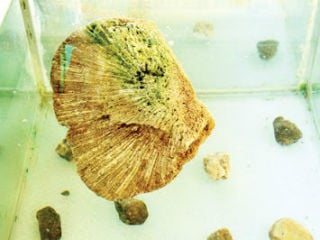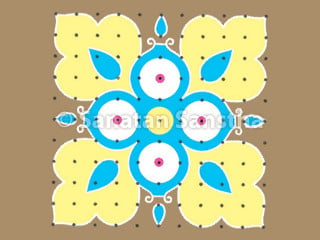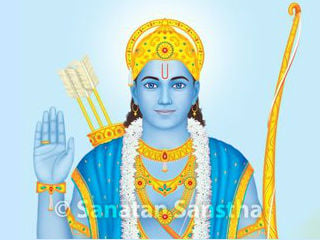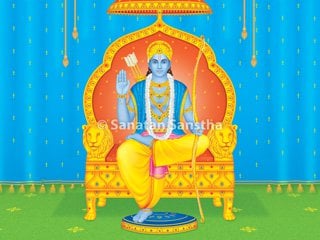During the coronavirus pandemic, the government of India locked down the entire nation to contain the spread of the virus. During this time, the national TV carrier Doordarshan channel re-telecast the two serials from the 1980s, Ramayan and Mahabharat. Even in this period of calamity many received solace and peace viewing the incidents from the lives of Prabhu Shriram and Shrikrushna and Their devotees and witnessed their Divine play. This also gave the audience the spiritual strength to face the coronavirus crisis. As the Holy texts in Sanatan Dharma are enriched with Spirituality they will never get outdated and that is precisely why repeated reading of these Holy texts endows the spiritual experiences of only Bliss and peace even today.

One thing that stood out while watching Ramayan was the selfless devotion of Bharat, Prabhu Shriram’s younger brother. Prabhu Shriram was the seventh incarnation of Bhagwan Vishnu. Shriram born to Kausalya, Bharat to Kaikeyi and Lakshman and Shatrughna to Sumitra were all the sons of King Dashrath. Prabhu Shriram has innumerable devotees, but in this article we will learn about the spiritual virtues of Bharat. Let us pray to God we also can become as devoted as Bharat was to Shriram.
1. The pinnacle of detachment
Kaikeyi exacted two promises from King Dashrath – the first that Bharat be made the crown prince instead of Shriram and the second that Shriram be exiled from the kingdom for 14 years. Present day politicians stoop to any level to gain political power. Here Bharat was becoming the crown prince without even asking for it ! He could have become the emperor of Ayodhya but he rejected the throne despite being capable of it. This itself indicates his level of detachment. Even Deities do not possess such detachment. All of us know how much desire and attachment Deity Indra harbours for his throne. So from this we can estimate Bharat’s spiritual prowess, for he was able to refuse the crown !
2. Calling himself the servant of Prabhu Shriram

Though Bharat was a prince from the Raghu dynasty and the younger brother of Shriram he referred to himself as the servant of Prabhu Shriram. This is because He considered Shriram more as God than an older brother. The spiritual emotion that he had towards Shriram was ‘God is my Master, I am an ordinary servant rendering seva at His Holy feet’. This shows the high level devotion of a servitor unto Shriram. It is because of this very devotion that he went to Chitrakoot and pleaded with Shriram to return to Ayodhya and rule after which Shriram assured to return to rule Ayodhya after 14 years of exile. Bharat then insisted that he would instate Shriram’s wooden footwear on the throne and look after the kingdom as his servant. Shriram had to accept defeat before Bharat’s his love and devotion and was compelled to hand over His footwear to Bharat. Bharat, who could have been the crown prince, placed the footwear on his head with immense gratitude and walked barefoot to Ayodhya. There he instated Shriram’s footwear on the throne. This action reveals his intense respect and devotion unto his Master. We hear about ‘Dasyabhakti’ (the spritual emotion of devotion as a servitor to God) but Bharat was a living example of this.
3. A staunch follower of Hindu Scriptures
When Prabhu Shriram, Lakshman and Sitamata arrived at Chitrakoot they learnt about the demise of King Dashrath and were deeply bereaved. As advised by Sage Vasishtha the spiritual guide of their family, Shriram, Lakshman and Bharat performed the ritual of ‘tarpan’ in River Mandakini to appease the soul of their father. Bharat, clad as a hermit gave up his palace and royal pleasures. He built a hut in Nandigram and lived a life of celibacy and austerities. Even in that state he fulfilled all the duties of an ideal king. So in the real sense of the term he followed all the four pursuits of life (purusharthas). Bharat, like King Janak, too was a Sage despite being a king.
4. An ideal administrator who followed Prabhu Shriram’s command
When Prabhu Shriram told Bharat that he should rule the kingdom for 14 years, Bharat replied, “I am younger than you in age, knowledge and experience. How will I be able to rule such a huge kingdom ? Prabhu Shriram responded, “Rule the kingdom under the guidance of Sage Vasishtha, our royal and family spiritual guide, Sumant our minister and King Janak a royal sage who is like a father to us”. Bharat obeyed Shriram ruled the kingdom in an ideal manner with strict compliance of Scriptures. Since Bharat had instated the footwear of Prabhu Shriram on the throne of his heart he had merged with Shriram completely, so this rule was indeed Rama’s rule of righteousness (Ramrajya). None in his kingdom was unhappy or distressed. He nurtured his subjects with fatherly love.
5. Sage Vasishtha’s praise for Bharat
Sage Vasishtha had this to say about Bharat. “Bharat performed a great mission renouncing his royal position, opulence and pleasures. So he was no longer an average individual, he became ‘Mahatma (Supreme Soul)’ Bharat. Hence His name will be etched in history, even before that of Prabhu Shriram. His mind was unblemished, selfless and pure. When speaking about ideal devotion unto Shriram Bharat’s devotion will be emphasised upon and obeisance paid to Bharat will most certainly be delivered unto Prabhu Shriram.”
6. When Bharat placed Prabhu Shriram’s
footwear on his head Deities and Sages from the
Universe blessed him by showering flowers upon him
Though physically Bharat was away from Shriram, in the mind, he was perpetually with Him. He constantly remembered Prabhu Shriram and remained in communion with Him. This is how he ruled the kingdom. The footwear of Shriram were in his mind and he chanted ‘Shri Rama Jai Rama Jai Jai Rama’ continuously. He would worship the footwear he had placed in his heart with spiritual emotion because of which subtly Prabhu Shriram was constantly with him. Let us pay obeisance at the Holy feet of this jewel in the crown of devotees, the great soul and royal Sage, Bharat. The opulence of the entire universe and the merits of the meritorious souls will be meaningless before this great devotion of Bharat. Hence when he held the footwear of Prabhu Shriram on his head, the meritorious souls, Divine souls, Sages, celestial attendants of Deity Kuber (yaksha), celestial musicians (gandharva) and all Deities from different regions of the universe blessed him and honoured him by showering flowers upon him.
7. Keeping up his promises unto Prabhu Shriram
When accepting the command from Prabhu Shriram to look after kingdom in His absence. Bharat said, “I will but on one condition, that after completion of the 14 year exile You will immediately return to Ayodhya. If you delay this then I will immolate myself.” This pledge made by Bharat astonished everyone and made them anxious too. However Prabhu Shriram promised to return to Ayodhya as soon as He completed the 14 year exile. After annihilation of Ravan as the 14 year exile period was coming to an end Prabhu Shriram, Sita, Hanuman and some soldiers from the Vanar army (sena) returned to Bharat from Lanka in a pushpak vimaan. To prevent self-immolation by Bharat due to His delay in arrival, Prabhu Shriram sent Hanuman ahead to Ayodhya to deliver the message of His arrival. As the 14 year period was almost over and there were no signs of return of Shriram Bharat was preparing to immolate himself when Hanuman reached there with Shriram’s message. Elated Bharat changed his decision and had the whole of Ayodhya decked up to celebrate Shriram’s homecoming. Bharat’s devotion unto Shriram was so intense that he had surrendered himself unto Him completely. Also as he could no longer bear the pangs of separation from Him he was even willing to give up his life. This is proof of a pledge associated with the Raghu dynasty – death is prefereable to breaking one’s word. Is there a greater need to glorify Bharat, who was willing to give up his everything to God with a smiling face ? When Shriram arrived along with Sita in the pushpak vimaan Shriram and Bharat met. Not only residents of Ayodhya but entire creation was eagerly waiting to witness the reunion of God and His devotee after a 14 year separation.
8. Bharat lived an ideal spiritual life of the
highest level, not on the psychological level
Bharat was deeply grieved when his mother Kaikeyi did not allow the coronation of Prabhu Shriram and instead had him exiled for 14 years. This anguish was due to the relationship that he shared with Shriram. Its was not that of a brother but an inseparable relationship between God and His devotee. He was angry with his mother and pledged not to look at her again. It is only when Prabhu Shriram returned to Ayodhya that He convinced him to forgive her after which he resumed good relations with her. In worldly terms Prabhu Shriram and Bharat were step-brothers, but on the spiritual plane that he was, Bharat believed that Shriram was his God dearer to him than his own life. This shows how instead of living at an emotional level Bharat was leading a high level spiritual life.
9. Bharat created Rama’s rule of righteousness (Ramrajya)
Bharat was also well versed in politics and the code of ethics (nitishastra). In the absence of Prabhu Shriram he looked after the kingdom well. His conduct was so pure that the subjects began to see a reflection of Shriram in him and began performing spiritual practice and following Dharma earnestly. Due to his excellent management of the kingdom enemies never attacked Ayodhya. Also as residents of Ayodhya lived righteously neither was anyone unhappy nor were there natural calamities or emotional unrest. This is how Bharat created Rama’s rule of righteousness with his able administration.
10. Bharat was absolutely disinterested in ruling the kingdom
Bharat returned the kingdom to Shriram after his 14 year exile. He ruled simply as his duty, selflessly sans attachment. As Bharat was detached despite him being the ruler he did not get entangled in royal opulence or power at all.
11. Bharat performed spiritual practice along
four paths – Action (Karma), Devotion (Bhakti),
Knowledge (Dnyan) and Meditation (Dhyan)
Bharat, a devotee of Shriram was a confluence of several Divine virtues. He accomplished all duties at the individual and societal levels and became an ideal son, brother, king and devotee in the eyes of the people. He harboured immense spiritual emotion of a servitor unto Shriram because of which internally he was performing spiritual practice along the path of devotion. He was well versed in Hindu Scriptures and Spirituality hence his conduct was in keeping with them. The time that he got after his royal duties Bharat would meditate upon Shriram. In this way he performed spiritual practice along all four paths – Action, devotion, knowledge and meditation and attained the highest spiritual state of an ideal follower of the path of action, a scholar of the highest order, a great devotee and the steady-minded one.
12. Similarities between Bharat
and Prabhu Shiram due to their merging
Bharat had merged into Shriram so much that his complexion appeared bluish like that of Prabhu Shriram, he was lotus-eyed and his body emitted a Divine sandalwood fragrance. The beauty of Bharat, a devotee of Rama was uniquely Divine. There was so much similarity between the two that when subjects looked at Bharat they would think that they had a vision of Shriram. Not only was his external appearance like that of Shriram but he also harboured the Divine virtues of Prabhu Shriram. This article shows how not only Prabhu Shriram but also all his devotees were ideal.
Due to the immense grace of God I was able to write about Mahatma Bharat spontaneously. It is God Himself who penned these thoughts for me for which I offer gratitude a million times at His Holy feet.

 A stone and a coin from the era of Shriram !
A stone and a coin from the era of Shriram ! Rangolis that attract and emit Shriram tattva
Rangolis that attract and emit Shriram tattva Worship of Shriram
Worship of Shriram Shriram
Shriram